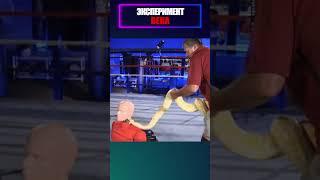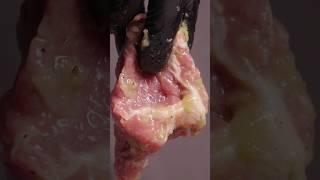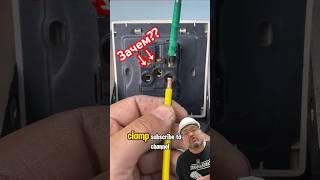Комментарии:

You're still doing high school-level mechanics.. I watch some of your videos and all basic the same thing..
Ответить
brother, it' not a bad idea to open the bleeder valve when retracting the piston.... better to be over cautious for square cut seal or piston boot not sealing...
Ответить
I only open the bleeder if the piston fails to retract. in that situation I open the bleeder to see if the flex line has collapsed or if the piston is seized.👍
Ответить
Na just open the fill lid
Ответить
I open mine bc I live in the rust belt so I kist make sure I can ope. The bleeder vales
Ответить
All the rusty crap that gathers @ lowest point, gets pushed backwards into inexpensive ABS unit. You haven't lived till you've plugged one up and customer sues you to fix it.
Ответить
Try using a flat blade screw driver on the caliper and pry the piston back before even removing anything.. nice trick most don't realize...
Ответить
Why is there a caliper on a wheel that has a drum/brake shoes in that video? Are my eyes deceiving me?
Ответить
Thx bro
Ответить
If you crack the bleeder you have more chance of introducing air to the system.
Ответить
Great comment on the brake fluid situation. More should hear this.
Ответить
Thankyou sir i agree with you 100%
Ответить
Some vehicles with brake wear indicator use brake fluid level.
Ответить
Just have the cap off the brake cylinder simple
Ответить
My breaks exploded when I was breaking heavy once and I lost all pressure,luckily I had enough room to get past a cut turning right in the middle of the road and I had to use the handbrake
Ответить
I just take the master cylinder cap off..done and next
Ответить
In August you people never went to school but I was ASC Certified ASE Automotive Service excellence which I'm sure y'all guys wouldn't know nothing about that but there are certain model of exotic cars and some not so exotic that just one little grain of sand or whatever it is it happens to be in that brake fluid will cause corrosion because it fluid is absorbed water over the years so most of the manufacturers that I know of straight out of their own repair manual say do not push dirty fluid back into the master cylinder but you know I guess that's kind of one of those things travel at your own risk I'm out in West Texas and you know you just don't go up on a ranch if it says no trespassing so I guess you guys do whatever you want to do but that's pretty life and dangerment on breaks if you ask me anyway thank you and have a nice day
Ответить
In 20 years a mechanic iv never opened the bleeder . And never had a single issue. The reason some people are cautious about this is bursting the master cyclinder and or cap with pressure backing or fliping the master cyclinder seals . up but iv never seen it happen removing the cap is as good as it gets for me
Ответить
Very true what you said!
Ответить
If u open the bleeder valve, you're definitely gonna be bleeding the whole system when you're done. I find no point in that, if anything is behind the piston that means it's already inside the system, it's not like it'll come out of the bleeder valve anyways
Ответить
Obviously point.. calipers open low fluid. New pads , make the fluid come back to the reservoir
Ответить
Well the argument is for vehicles that have not had the brake fluid changed the chance the dirty fluid is sent back it's better to be on the safe side and not deal with the dirt causing the seal to fail prematurely
Ответить
Your doing good I've seen a lot of your videos I'm a mobile mechanic keep up the good work brother
Ответить
Open bleeder valve to flush old fluid from the cavity of calipers
Ответить
Change brake fluid every 2 years. If it coincides with a brake pads change do it, otherwise open the brake fluid cap when pushing back the piston and you are good to go.
Ответить
100 💯
Ответить
I never understood why people are so hard-core on that either. If your worried about trash it should be flushed anyway so that makes no sense to me.
Ответить
You can damage the seals on the Master Cylinder, how do I know? It happened to me.
Ответить
Yes absolutely correct. I never touch a bleeder unless I have to. I totally agree no adding fluid. If u do have to u have a leak somewhere.
Ответить
Question for anyone who have worked in brakes: Is that rubber boot important? With my rear disc brakes, I need to turn the piston while compressing it….and that tears up the rubber boot surrounding the brake piston.
Ответить
Many silly beliefs about how to fix things. Do it full time for 5 years and you will BEGIN to understand all kinds of things.
Ответить
Yeah never touch the bleeders unless your bleeding
Ответить
Open the brake fluid resaivor cap and boom problem solved. Close cap after u press caliper back.
Ответить
The concern is contaminating the abs system with trash and yeah, it's a good idea to open the bleeder.
I don't do this on my vehicles but admit I should.

Here I am...over here in the corner...trying to find all these ABS Systems, Seals, and Master Cylinders that blow themselves from the natural backflow when you take your foot off the pedal...
Ответить
EXACTLY! And leaving the bleeder closed, you can find leaks. Great video
Ответить
I just open up the reservoir cap that's it
Ответить
As other comments, debris in old tired fluid has the potential to cause damage to the ABS pump. In their conception when ABS became mandatory, and if you ever went to a clinic, thats what the guys putting the courses warned us about. I have done it both ways with never an issue other then rusted out bleeder screws.
Ответить
I have heard of opening bleeder valve in the past. The theory is that if there is debris in brake fluid that it will push the debris up into the ABS assembly and would potentially cause issues with the ABS not being able to re-home itself but I have done both procedures and never had a problem whether opened bleeder or not. Let’s be honest here too, most bleeder valves are rotted horribly and you don’t even want to breathe on it. Can crack open with heat but what is that doing to the integrity of the brake fluid. Love your vids man they are all great,
Ответить
100% correct in all you said!
Ответить
Completely agree with you on this
Ответить
Part of this practice stems from the old kelsey-hayes ABS systems. They were sensitive, and could get messed up by pushing fluid backward through them.
Ответить
I would always crack to bleeder especially if it’s an anti-lock system because that fluid in there is probably old and tired and you don’t want to shove it back through the antilock you want to replace it with fresh fluid.
if you crack the bleeder put a piece of tubing onto it into a soda bottle with some brake fluid in it so it doesn’t suck back in the air you automatically get fresh fluid as soon as you pump the brakes
But I am an unusual character I keep my vehicles for half a million or more miles.
one of them right at this point has 735,000 miles on it
I love your videos keep it up !

I could see one reason to open it would be to drain the fluid that was closest to the heat breaking the fluid down. Wouldn't be that much of an issue for the average driver but for someone who likes to drive the car hard they may want to swap out the fluid more often and perhaps even change to a fluid designed to handle higher heat.
Ответить
Mechanic for 25 years here to the fellow mechanic you’re not doing anything wrong you have these pseudo-mechanics on the Internet and they don’t have a damn clue what they’re doing but they love to tell others that they’re doing it wrong you do you brother
Ответить
Exactly. The bleeder valve is not open when the caliper is retracting during normal braking, so why open it when you're pushing it back in?
Ответить
Everything you said was the same thing Ford Boss Me said a day ago. Don’t open bleeder valve and if fluid is low it’s usually because pads have worn down unless there’s a leak somewhere.
Ответить
I’ve never opened the bleeder valve or loosened the reservoir cap! I’ve never had an issue 32 yrs of doing it! But I’ll probably start loosening the reservoir cap that’s a good idea!
Ответить
Worst
Advice
Ever.

Hey listen guy, you just don't push back caliper pistons, randomly, wrecklessly without loosening the reservoir cap. And if the vehicle has ABS of European design, (Diamler Benz?) You need to get down and check your wallet to ensure you can cover whatever damage you are installing through your negligence.
Don't be so short. Ask the techs who don't have the luxury of working on relatively young cars.



























